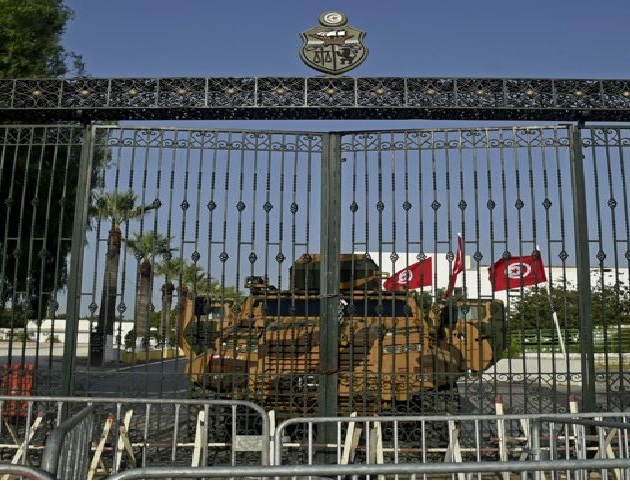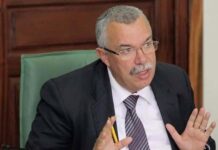The difference now is that the army and security forces are not in a neutral position. On the contrary, they support Kais Saied strongly and firmly. This position reflects the existence of a safety valve for Tunisia in the face of the ambitions and project of the Muslim Brotherhood.
Security Forces Play an Active Role in Supporting Kais Saied
Tunisia entered a necessary transitional phase in light of the failure of the experiment that began with the fall of the Zine El Abidine Ben Ali regime to achieve its goals.
For a decade, since Ben Ali’s departure from Tunisia in early 2011, Tunisia has neither become more democratic nor more prosperous. On the contrary, there was a daily decline on every level at a time when it was clear that the Ennahda Movement, which is an integral part of the Muslim Brotherhood, had no goal other than controlling the joints of the state and changing the nature of Tunisian society to be backward and closed in on itself at the same time.
The exceptional period appears to be characterized by Kais Saied’s exploitation of the time factor in order to pass a new constitution that would enhance the powers of the President of the Republic. This will allow the President of the Republic to work away from the political quarrels that made the ordinary citizen, unfortunately, sympathetic to the stage before the “Jasmine Revolution.”
The last ten years of Tunisia’s history have been nothing but frightful stagnation and decline. In terms of numbers, political stagnation and economic, security, civil and social decline occurred at the same time.
It is no secret that the majority of Tunisian citizens support President Kais Saied, who is leading the process of change that aims to get out of the state of chaos prevailing since 2011, which almost destroyed the institutions of the modern Tunisian state with modern laws.
In late 2010, the army and security forces refused to rescue Zine El Abidine Ben Ali when he tried to get their help. Neither the army nor the security forces fired on the demonstrators who filled the streets at that point and forced Ben Ali to leave.
What also cannot be ignored is that this army did not intervene when the change took place on November 7, 1987. In that time, Zine El Abidine Ben Ali, Habib Ammar and Abdel Hamid El-Sheikh who controlled the armed forces had no difficulty in removing Bourguiba although he was an exceptional national figure.
Over time, it will become clear that history is repeating itself in Tunisia, with the difference that this time the army plays an active role in supporting Kais Saied and the measures taken, including the formation of a new government that will be the government of the transitional period. This government will prepare Tunisia to enter a new era with a clear vision in which political life is regular, so that life returns to the economic movement and the productive sectors.
Kais Saied is simply seeking measures to enhance his powers and allow him to issue legislation with presidential decrees in preparation for the later disclosure of the details of the transitional provisions and the legal exits that will be adopted to manage the next phase.
It was remarkable that the measures taken were published in the Official Gazette, about two months after the President of the Republic announced the freezing of Parliament, dismissing the government and assuming powers in the country himself, based on Article 80 of the Constitution.
The executive power, under the 2014 constitution, was in the hands of the government, which was accountable to Parliament, but under the new measures, it would be accountable to the President of the Republic.
Can Kais Saied be another Bourguiba or another Zine El Abidine Ben Ali? What united Bourguiba and Ben Ali was the preservation of state institutions and the effectiveness of official administrations. It is true that Ben Ali could not stand the emergence of any political figure in the country, but it is also true that the governments and administrations during his long reign were very effective.
Tunisia has no other choice but to undertake the required reforms if it refuses to turn into a failed state under the auspices of the Muslim Brotherhood. The next few months will be important for a country that really needs democracy, but it also needs a new constitution that organizes its political life away from chaos, nepotism, corruption, and seeking to destroy the administration by stuffing it with Brotherhood supporters…
Kais Saied will play the role required of him in serving his country. It is not clear, at least until now, whether he seeks to be Bourguiba or another Ben Ali? But what is certain is that he has relied in everything he has been doing for about two months on the support of the army and security institutions, as well as the support of several Tunisian sectors, foremost of which is civil society, which knows well the difference between what the Muslim Brotherhood says in public and what they do in secret.
The methods adopted by the Muslim Brotherhood no longer deceive anyone, neither in Tunisia nor outside Tunisia. This does not preclude the question: Where is Tunisia headed? The first and last bet is on the role of the deep state, including the role of Tunisian women, and on the army’s survival in the role of arbiter that only supports truth and preserves civil peace. This is what they did at the end of the Bourguiba and Ben Ali eras. This is what they did when Kais Saied took his last steps, starting with stopping the skits in the parliament hall during Rached Ghannouchi’s presidency.
Translated from an article by Lebanese journalist Khairallah Khairallah
Al-Arab Newspaper











